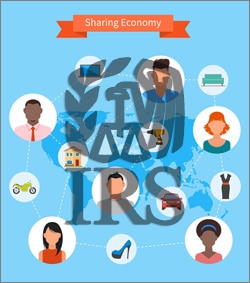 More than seven million people will earn money in the sharing economy by 2020, according to expert forecasts. Though the term broadly refers to short-term, part-time and/or temporary shifts, tasks or projects workers can take on at will to generate income, it extends beyond tasks, to include renting out goods and property.
More than seven million people will earn money in the sharing economy by 2020, according to expert forecasts. Though the term broadly refers to short-term, part-time and/or temporary shifts, tasks or projects workers can take on at will to generate income, it extends beyond tasks, to include renting out goods and property.
While the ability to work when, where and for how much a person feels their time or effort commands benefits workers, customers, and sharing economy providers, the tax implications of it can be more complex than many realize when they set out to earn some extra cash with a side gig.
Here are some tips and tools to ease the headache of tracking how much income you make from a side gig, how to track expenses you could claim relative to it, and what your role in the sharing economy means for your tax filing, payment and preparation.
Don’t rely on forms to track your income. You may not consider yourself self-employed just for picking up a few Uber shifts in your downtime, but the Internal Revenue Service does. It expects you to report your income, document expenses you’ll claim, and pay estimated taxes like one.
Yet one of the most confusing parts about filing taxes in the sharing economy is that there aren’t “one size fits all” rules for workers, or employers. If you enter into a side gig directly with an employer as an independent contractor, for example, they’re supposed to send you a 1099 form reporting what they paid you at the end of the tax year—but that only applies if you made more than $599. If you don’t make more than that from one payor, the onus is on you to know what you made, from whom, and report it. (The same is true even if you do make more than $599 from an employer, and they fail to send you a 1099 form).
If you earn money through a third-party sharing economy service (like Uber), you might receive a 1099-K stating what you earned for the tax year. But those services are required to send a form only to workers who earn more than $20,000 and/or had more than 200 payment transactions throughout the tax year. If they don’t issue a form, it’s up to you to know what you made, from whom, and to report it on your tax return. Cash payments or those issued by personal check must be tracked and reported (by you), too.
To make matters more complicated, there are some cases where you can earn income in the sharing economy—but not be taxed on it. If you rent a room in your house for fewer than 15 days a year on a site like AirBnB, for example, you may not pay tax on income earned. But that also means you’re not eligible to take the deductions associated with the rental, including costs for supplies (like fresh linens), or services you may have furnished for your renters.
The moral of the story in a sharing economy? Keep detailed records of what you earn, when you receive payment, how, and from whom. Designate one bank account to receive payments from your sharing economy gigs; use it for any expenses related to it that you’ll claim when you file your tax return
Free sites like Wave make it easy to track what you earn, even if you have multiple sources of income, and are paid through a variety of methods, including cash, check, Paypal, and/or bank transfers.
Dedicate part of your earnings to estimated taxes. The IRS expects many workers who make money in the sharing economy to pay estimated taxes (in four equal installments) each quarter, based on what they expect to make over the course of the year. Missing the due date for estimated taxes and/or not paying enough tax relative to what you report could mean you owe underpayment penalties—even if you get a tax refund when you file your annual return.
Establish a bank account where you’ll save specifically for your estimated quarterly taxes. If you have no idea how much tax you should expect to pay, experts at Time recommend you set aside at least 15% of your monthly earnings for estimated tax payments.
Use professional tools to guide you. The IRS recently launched a Sharing Economy Tax Center to support the increasing number of taxpayers who earn income in the sharing economy. Consult the IRS’ official rules for clarification on any tax-related information you receive about side gigs, and to validate the tips you read online.
While the IRS reports that popular online tax preparation sites will be updated by 2017 to reflect the amount of taxpayers earning money in side hustles, it may be worth investing in a CPA who is well-versed in the tax rules for side gigs. He or she can help you maximize your potential deductions, and make sure you’re abreast of how to report your income, file supporting paperwork, and calculate estimated taxes if you continue to be part of the sharing economy in years to come.

